|
|


ADVERTISEMENT
Buy Your own advertising
spaces!
.
Download Adobe Acrobat Reader to open [PDF] files.
Recent Visitors
China stages biggest maritime rescue exercise
2009. 4 September
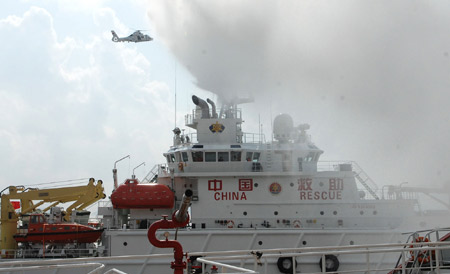 A rescue ship sprinkles water to control the fire on a passenger ship after a "collision" during a maritime rescue exercise in the East China Sea, on Sept. 4, 2009. China's maritime rescue services staged their biggest ever exercise in the East China Sea Friday to test the country's maritime rescue capabilities and security for the Shanghai World Expo in 2010.(Xinhua Photo)
A rescue ship sprinkles water to control the fire on a passenger ship after a "collision" during a maritime rescue exercise in the East China Sea, on Sept. 4, 2009. China's maritime rescue services staged their biggest ever exercise in the East China Sea Friday to test the country's maritime rescue capabilities and security for the Shanghai World Expo in 2010.(Xinhua Photo)
by Li Jianmin
(news.xinhuanet.com)
China's maritime rescue services staged their
biggest ever exercise in the East China Sea Friday to test rescue capabilities
and security for the Shanghai World Expo in 2010.
The exercise, jointly held by the Ministry of Transport and east China's Zhejiang Province, involved 35 ships, three aircraft and more than 1,000 personnel, said He Yipei, deputy general director of the exercise and deputy director of the Zhejiang Maritime Safety Administration.
The exercise began at 9 a.m. off the coast of Ningbo and lasted about an hour.
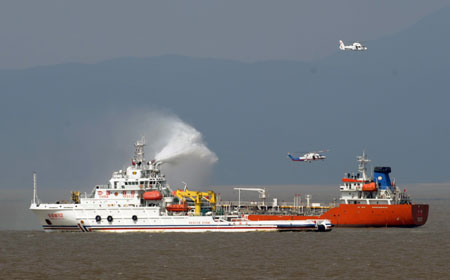 The exercise simulated a collision between a passenger ship carrying 390
people and a cargo vessel loaded with chemicals, resulting in a fire on the
passenger ship and a benzene leak.
The exercise simulated a collision between a passenger ship carrying 390
people and a cargo vessel loaded with chemicals, resulting in a fire on the
passenger ship and a benzene leak.
Rescuers transferred the people in danger, treated those overcome by fumes, controlled the chemical leak, searched for people in the water, put out the fire and evacuated 16,000 people living along the coast in the area of the exercise.
Only one passenger "died" in the "accident."
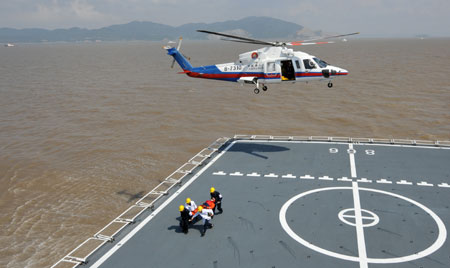 "The exercise was successful," said Xu Zuyuan, Vice Minister of Transport
and director of the China Maritime Search and Rescue Center.
"The exercise was successful," said Xu Zuyuan, Vice Minister of Transport
and director of the China Maritime Search and Rescue Center.
"It displayed the achievements of China's maritime rescue services over the past six decades, tested their rescue capabilities and helped improve their rescue skills," he said.
He said the exercise also tested the country's maritime security for the Shanghai World Expo in 2010, which is expected to attract 70 million visitors from next May 1 to Oct. 31.
The exercise site was Fodu harbor, at Ningbo-Zhoushan Port.
"It is not only one of the busiest navigation channels in the world, but also an area that sees frequent maritime accidents and chemical leakages. That is why we choose this area," He said.
Last year, the Ningbo-Zhoushan Port ranked second in the world in terms of cargo throughput, with 521 million tonnes, and eighth in container throughput, at 10.923 million TEUs.
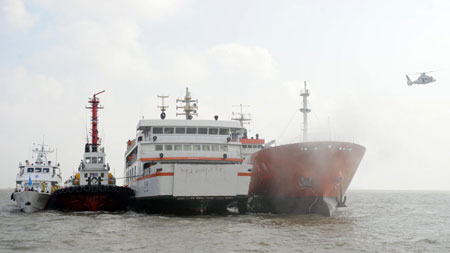 According to the Zhejiang Provincial Maritime Search and Rescue Center,
local maritime rescue services handled 85 accidents off the coast of Zhejiang in
the first half and saved 1,153 people. Almost60 people died or were missing in
the period.
According to the Zhejiang Provincial Maritime Search and Rescue Center,
local maritime rescue services handled 85 accidents off the coast of Zhejiang in
the first half and saved 1,153 people. Almost60 people died or were missing in
the period.
Nationwide, 882 sea accidents were reported in the first half and almost 9,000 people required rescue, according to the China Maritime Search and Rescue Center.
"The handling of accidents at sea can demonstrate a nation's maritime technologies, coordination abilities and construction of maritime security forces," said Liu Gongchen, general counsel of the exercise and chief inspector of safety with the Ministry of Transport.
"Although there is still a gap in maritime rescue services between China and advanced countries, we are confident that we can catch up," he said.
NON-GOVERNMENTAL RESCUE FORCES CALLED FOR
In addition to rescue services from governmental authorities, non-governmental rescue forces were invited to participate in Friday's exercise.
"That conforms to the actual situation of China's maritime rescue, as most of the people involved in sea accidents are saved through non-government forces every year," Liu said.
He said there is a great number of small privately-owned boats in China and they are very flexible in rescue operations.
"Their sailors are quite familiar with local maritime and weather conditions, and they can arrive at the site soon if an accident happens," he said. "While the professional rescue teams from government can better cope with very adverse conditions such as strong winds, huge waves and bad weather.
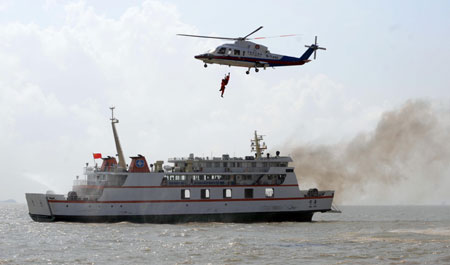 "Therefore, governmental forces are far from enough in rescue operations.
They should be complemented by non-governmental rescue forces," he said, citing
the great role played by volunteers in disaster relief after a devastating
earthquake measuring 8 on the Richter scale struck southwestern China's Sichuan
Province in May last year.
"Therefore, governmental forces are far from enough in rescue operations.
They should be complemented by non-governmental rescue forces," he said, citing
the great role played by volunteers in disaster relief after a devastating
earthquake measuring 8 on the Richter scale struck southwestern China's Sichuan
Province in May last year.
"The combination of the two forces will be the orientation for developing China' maritime rescue system," he added.
But the non-governmental maritime rescue forces are still in a starting phase and many of them complain of high risks and costs.
Guo Wenbiao, a 42-year-old fisherman from Zhejiang's Wenzhou City, is one of them. He has saved more than 130 lives at sea over the past two decades and asked for no rewards. But he has also almost used up his bank deposits for his unselfish deeds and leads a poor life now.
"I saved the first person from sea at the age of 15. From then on, I began rescuing people while fishing," he told Xinhua Friday in Ningbo. He was invited to observe the exercise as a VIP guest.
"Now, more and more people come to me for help, and I have to give up fishing and focus on rescue. I used to live a well-to-do life, but now, I mainly live on collecting rubbish at sea," he said.
"I hope the government can boost investment in non-governmental rescue forces," he said.
In September last year, the first non-governmental maritime search and rescue team on the Chinese mainland was set up in Wenzhou's Cangnan County where typhoons frequently visit. The team is composed of 148 fishermen volunteers and 30 boats. But the first thing they did was to raise funds to continue their normal operation.
"Currently, there are no special funds allocated for non-governmental rescue forces in China, which reduce their willingness to participate in rescue operations," He Yipei said.
"So it is a dire need for us to set up a compensation or reward mechanism to encourage more non-governmental forces to pitch in with rescue operations," he said.
Source: news.xinhuanet.com

